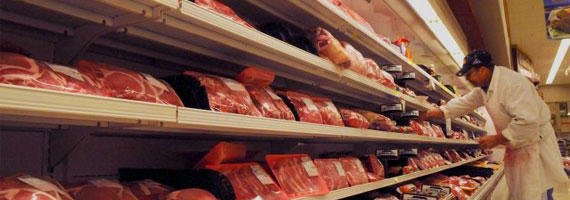Commissary officials want to remind shoppers that following simple food safety guidelines could be the difference between getting sick and, well, not.
The commissary says they have your back when it comes to making sure that their storage and handling keeps food safe. In a recent news release they said they have a "network" of military and civilian food safety specialists "engaged in a multitiered inspection process designed to safeguard commissary products from any potential security and sanitation problems." And last year, after a overseas commissary was briefly shuttered due to a rodent problem, the commissary's top safety official told us in a statement that each store does periodic inspections to look for signs of rodent problems. (Comforting, huh?)
Now they want to make sure you are doing your part, too, by reminding shoppers of a few helpful ways to keep perishable food from going bad or from contaminating your other food, even while in the store or just after leaving.
Here are a few of their tips.
It starts in the shopping cart.
You and I both know that sometimes getting through the commissary alive is a award worthy. Who has time to think about how food is stacked in the four inches left in the back of the "car cart" you scored to encourage peace and tranquility among your children? Not me.
But commissary officials say it starts here.
"Separate raw meat, poultry, and seafood from other foods in your grocery shopping cart and in your refrigerator," they said in the release.
Although they didn't say it, I would imagine it would be most helpful to make sure it is far, far away from that items like that loose leaf spinach you stuffed in a bag during The Great Produce Section Teddy Graham Battle of 2014 and then mindlessly tossed in the cart. Putting meat in an extra bag before putting it in your cart is also likely a good idea (assuming it's not pay day and they have some on the roll. Let's keep it real here).
Go home. Now.
Sometimes just getting out of the house with two shoes is a challenge -- and I don't mean my kid's shoes. I mean my shoes. Once I've gotten all the way over to the commissary I like to run as many errands on that side of town as possible. Since I also like to go grocery shopping as early in the day as possible, that sometimes means I have heaps of potentially slowly spoiling groceries in my trunk.
Commissary safety officials say this is a no-no.
"If you have several stops to make while you're out shopping - like the exchange, the gas station and the medical clinic - do that before you hit the commissary to decrease the risks of temperature abusing your food, which increases the probability of dangerous microbial growth that can turn into a foodborne illness," Richard Stith, DeCA's lead consumer safety officer, said. "Once you purchase your perishable items, remember to keep cold items cold and hot foods hot."
I often hit the commissary with a cooler in the back of my car and ask the baggers to please put the cold items in there. And of course all of this gets much easier in the winter, when the colder-than-inside-my-refrigerator temperatures mean that EVERYTHING in my car is cold, including me.
Put away your food. And then cook it thoroughly. And then clean-up your mess.
When we roll into our driveway, and all the people who needed a potty break have had one, and the dog has been let out, and I have poured myself more coffee, and ...
You get the picture.
Commissary officials say putting food away promptly can keep temperatures from rising any more than they already have and, therefore, halt bacteria from growing. When you do cook meat, make sure it has cooked to a safe internal temperature (165 for poultry). And although getting dinner on the table can feel like victory enough, take time to sanitize after all is said and done.
We know you have some favorite food safety tips. Share them!
Photo courtesy of the U.S. Army.










